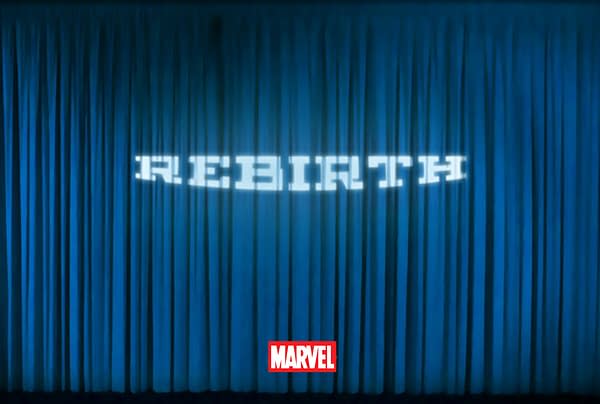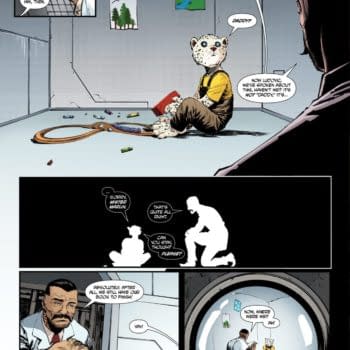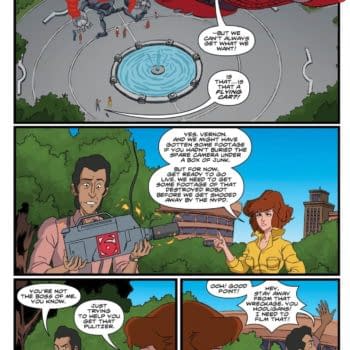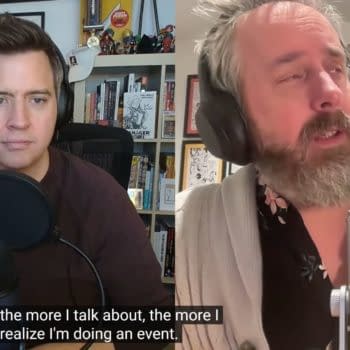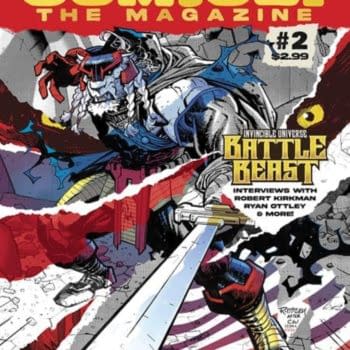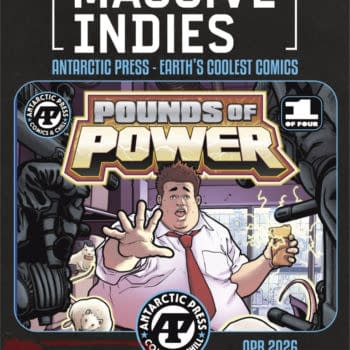Posted in: Comics | Tagged: dc, marvel, nick spencer, retailer summit
Wrapping Up Retailer Summit Debacle, Marvel Is Not Blaming DC For Industry Woes, They're Just Saying It's DC's Fault
It's only Saturday, but its been a long weekend for Marvel Senior Vice President of Sales and Marketing David Gabriel. Gabriel's troubles began when Marvel allowed website ICv2 to attend a retailer summit that he and Editor-in-Chief Axel Alonso treated like a candid closed door meeting. Lots of things were said at this summit that have made for salacious headlines, with some claiming that quotes from the summit are taken out of context.
https://twitter.com/nickspencer/status/848093206717751296
Although…
https://twitter.com/nickspencer/status/848252457368961024
So take that, Newsarama!
But the really real talk, if we're really being real, is that these quotes are entirely in context, just maybe not the context Marvel would prefer. The context of these quotes is that Marvel seemingly wasn't expecting these quotes to be repeated to anyone except the retailers whose complaints about low sales they were trying to address. A lack of PR sanitizing doesn't mean the quotes are taken "out of context." What's more likely to reflect what's actually in your heart: the things you say when you know the world is watching, or the things you say when you think nobody is listening? We'll leave it to you to decide, readers.
And pointing out that websites publish articles for "clicks" is like pointing out that water is wet. All websites publish all stories for clicks. That's the business they're in. Just like everything Marvel does, they do to sell comics. And the customers buying comics, we should keep in mind, aren't necessarily readers. They're retailers. Once the books are sold (or overshipped) to them, Marvel's job is done. It's the retailer's job to unload those comics on readers. And since October, it seems, they've been having a little trouble with that.
So Marvel invited those retailers to their offices, sat them down, listened to their complaints, and then did their absolute best to convince them that all of those complaints are the fault of anyone and anything other than Marvel itself. They've blamed readers not wanting any more diversity, creators going to Image, limited series being a "death knell" for comics, not being able to lower trade prices because it would reduce sales of existing more expensive ones, artists being late on super-mega-crossover events, the election of Donald Trump, event fatigue, and artists not "moving the needle" on sales.
It's important to remember, if we're looking for context, that the vast majority of things said at the summit are excuses, designed to deflect blame. The thing the excuses all have in common is that they're all external forces outside Marvel's control, which means that Marvel doesn't need to make any substantial changes to their core business strategy to overcome them. There's nothing wrong with the tactics of constant super-mega-crossover events, number one issue relaunches, vast market over saturation, and turning heroes into villains that Marvel has relied on for the past decade. Most importantly, if you believe all of that, that means that there's no need to look at Marvel leadership as the potential source of the problem. The whole big mess this weekend is the Marvel executive version of "the dog ate my homework." In other words, the unifying message of all these statements is:
In context here, everything is relative. It's possible that deep down Marvel's top brass really do believe in diversity. Just not enough to not throw it under the bus when retailers are mad at them. It's similar, in a lot of ways, to how many Marvel creators are vocally against the policies of president Donald Trump, but keep quiet about the fact that Marvel's Chairman, Ike Perlmutter, has donated millions of his own dollars (which come from Marvel's success) to Trump and serves as an official advisor in his administration.
Now that we've cleared up that whole context thing, we can look at what we promise is the last quote from the Marvel Retailer Summit Debacle, or at least, the last one from Day One (and it will be interesting to see if the Day Two report actually comes out after all of this).
In this final installment, part of ICv2's interview with David Gabriel, Gabriel is asked about comments he made at ComicsPRO blaming industry woes on DC's status-quo disrupting strategy of making their Rebirth comics returnable, a bold move that puts the financial risk of selling on DC Comics, not retailers, and something that Marvel clearly wants no part of. Let's listen in:
What we heard people tell us coming out of ComicsPRO was that Marvel was pointing to DC as a reason for market problems. You've talked a little bit of that with regard to returns being in the pipe and that being an issue. I guess the question is do you think that's a fair characterization of what you were saying? Or do you think that is only focusing on one part of it?
I think they only focus on one part of it. When I presented, what I presented was just taking the market share that Diamond put out, not that we devise for ourselves, and showed where the biggest hits to market share for DC was in terms of when units and dollars left the market or left DC based on when their returns were coming in. I said that was one of the reasons for the industry being down dollar-wise.
Another reason was that the industry lost Hastings chain, so nobody bothered to bring that up afterwards.
I was adamant in saying I'm not blaming DC for anything. I'm pointing out what we saw in the Diamond charts and what we knew was coming and what we've heard from retailers and Diamond as well.
Of course, people walked away. You and I have talked about this before. People who always want to bash us wanted to walk away and say that I blamed DC for that. We think it [returnability] was a bad practice. We think it's obvious where it hurt the industry.
I haven't heard from anybody today saying what a great thing that it was for the industry. Maybe I didn't ask them that, but nobody came back and denied that there were cash flow problems as a result of that returnability. That's the only thing I can say that was a problem for the individual retailers economically.
To sum up, Gabriel wasn't blaming DC at all, but it's still their fault. But you know whose fault it wasn't? Marvel's. Context, as always, is key.


